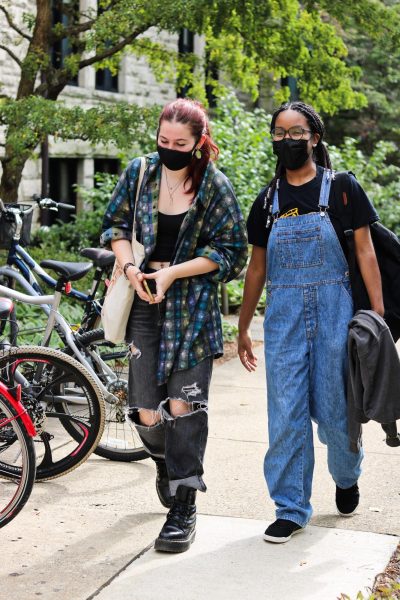On Addressing Student Stress, Oberlin Must Put Its Money Where Its Mouth Is
Recently, Student Senate presented findings on mental health to the Board of Trustees. I’d like to thank fellow Senators, including College third-year Emma Edney and College second-years Raavi Asdar and Kofi Asare, for leading Senate’s efforts in this area. They identified a distinct connection between the mental health of students and investment in student happiness. Their presentation made it clear that Oberlin must expand resources available in times of crisis; invest in areas that impact Oberlin students’ day-to-day happiness — i.e. housing and dining; invest in adding more events to the community social scene; and eventually upgrade Wilder Hall so it can justifiably be called a student union.
Investments of this nature are vital, and we must do everything we can to convince Oberlin to make them. That’s why, when Experimental College courses were threatened by financial challenges, I led the Senate effort to save them. The experiences that ExCo brings to our community are an essential part of our social fabric, and are all vital to student happiness. In order to maintain Oberlin’s prestige in an age of financial downsizing, we must invest heavily in student happiness and make Oberlin a better place to attend college.
However, a lot of the policy plans I’m working on don’t cost a single dollar, and can make a huge impact. In a recent Senate meeting, Vice President and Dean of Students Meredith Raimondo spoke about how reducing the stress of the student experience is a priority for administrators. The sentiment behind Raimondo’s words comes much appreciated, and many in the administration agree with her. But when it comes to real changes in policy, Oberlin still has significant work to do. Winter Term, career development, and housing and course selection are currently flashpoints of stress for students. These areas, critical to the student experience, are restricted by problematic policies, and must be addressed as soon as possible.
A friend of mine once called Winter Term “a festival of stress,” and in its current form, that’s a characterization I agree with. Applications for many Winter Term opportunities — including some programs offered by College faculty or other campus offices, as well as internships available through Handshake — become available at the end of the second week of October, and close in the beginning of November. The entire application period for those opportunities happens during midterms and fall break. Application results often come out in mid to late November, many just before Thanksgiving Break and one week away from the final deadline. Anyone banking on acceptance to a Winter Term program will find themselves in a desperate scramble if they don’t get any offers (which, given that available spots in on-campus, college-supported opportunities are limited to the point where most students cannot pursue them, happens far too often).
Moving the beginning of the application process forward would solve these problems. Instead of making Winter Term opportunities available in the second week of October, we can make them available on the first day of classes. That would allow us to add an earlier application round, giving students a second chance if they’re rejected from everything in round one. I’m working with the administration on a policy package to address these issues, as well as many other aspects of Winter Term. I look forward to continuing our cooperation as I spend this January on campus.
As soon as students return from Winter Term, they’re thrown right into another application process. At Oberlin, a competitive institution that appeals to competitive students, career development is a constant source of stress. The Career Development Center seeks to mitigate that stress and improve professional outcomes for students, but little stress is currently being mitigated. Inadequate investment, highlighted by the Academic and Administrative Program Review, is a big problem, but so is the model by which the CDC operates.
Currently, the CDC is not sufficiently geared towards Oberlin’s wealth of on-campus jobs and leadership opportunities, despite many of them being highly marketable and many students taking opportunities less reflective of their skills and career plans. The off-campus opportunities available through the CDC provide inadequate information on who can and cannot viably apply. While students can get more general advice from a CDC employee, this requires scheduling an appointment. Appointment wait times are usually a couple of days to a week, but can sometimes be as long as two weeks, and students can still end up with no information about specific opportunities.
These problems mean successful candidates could unknowingly accept an opportunity that isn’t the best one for them. Nonviable students, meanwhile, can throw away hours upon hours applying for opportunities they’ll never be considered for. Many companies or organizations that Obies can intern or work for operate under specific parameters (such as class year and major), which the CDC could procure data on. In just a few hours, the procurement of even some of this data could greatly improve student internship and career searches. If a company rejects all — or almost all — first-years, for example, that information should be available to students before they invest time in applying.
I’ve recently released my policy package on course selection, which is available in the article “Course Selection Issues Remain Unaddressed” (The Oberlin Review, Nov. 8, 2019). This, too, is an area of stress easily addressed by improving policy.
Similarly, Oberlin’s housing selection process is not exactly a source of fun and excitement. I’ve called for greater transparency in the process because of the vast disparities in housing quality and the unclear nature of allocation. Where other institutions build community in their dorms, we do not, and a problematic process creates unnecessary waves of displacement during housing selection.
All we have to do to reduce disparities and prevent displacement is open applications for Program and Theme Housing earlier. This way, instead of picking backups they’ll never live in, applicants know whether they’ve been accepted, and if they are accepted into their first-choice housing option, they no longer need to participate in the housing process with the rest of the student body. I’m currently working on a policy package to address these issues, as well as many others, so that the process meets the community’s needs instead of ignoring them.
There’s a common thread between these four areas of crisis: all are flashpoints of student stress and all can be fixed with simple, easy policy solutions. Investment in the areas that require it, especially the happiness of our community, is vital, and I’m continuing the fight to see those investments made. But ultimately, the fastest change will come in the areas we can easily change this year, and I’m excited to continue my work to make that happen.




